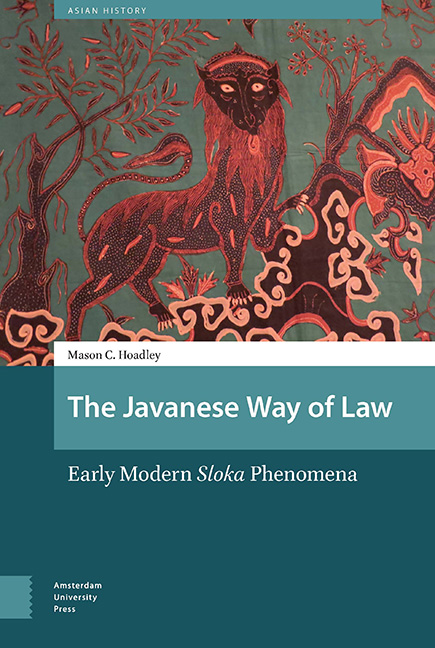2 - Sloka in Javanese Titles
Published online by Cambridge University Press: 20 November 2020
Summary
In analysing Javanese manuscripts relating to law some hard realities must be faced. A gap between what is needed and what is available is the most obvious. The ideal would be access to an authoritative text with an authentic date and provenance placing it in the time and space under consideration. Such a paragon would include a recognizable beginning, middle, and end; possess a reasonable degree of internal consistency; and show congruence or at least close similarity with the contents of other texts bearing the same name. Within the parameters of the present discussion such would come to pass if the list of the titles contributing to the Javanese legal tradition as found in the Pepakem Tjerbon were texts in the accepted meaning of the term.
Warned by Crawfurd's observations, it comes as no surprise that matters are not as straightforward as one might wish. The concept of text as a defined entity seems to be alien to traditional Javanese law. As noted earlier, there are several variants for most of titles contributing to our understanding of the subject. Even exceptions are challenging. These are titles found in a single manuscript whose unclear contents cannot be deciphered through reference to other exemplars. Another challenge is raised by the titles said to constitute the Pepakem Tjerbon. Study of their contents shows that there seems to be scant congruence between the compilation's contents and titles cited as its sources (see Appendix I, Table 1, ‘Literal authenticity’). Were it not for the titles’ self-identification it would be hard to recognize the various exemplars with the same name as a single text.
It is generally accepted that sources of information consist of those titles identified by nominal catalogue entries for manuscript packages. The latter are presently housed in archives and libraries in The Netherlands and Germany, the United Kingdom, and Indonesia. Such entries are nominal in that they draw upon criteria for identification deriving from internal information or contextual clues. Subsequently such identification has been transformed into definitive titles by curators, collectors, and scholars. Such can be embarrassingly short sighted.
- Type
- Chapter
- Information
- Javanese Way of LawEarly Modern Sloka Phenomena, pp. 33 - 64Publisher: Amsterdam University PressPrint publication year: 2019

